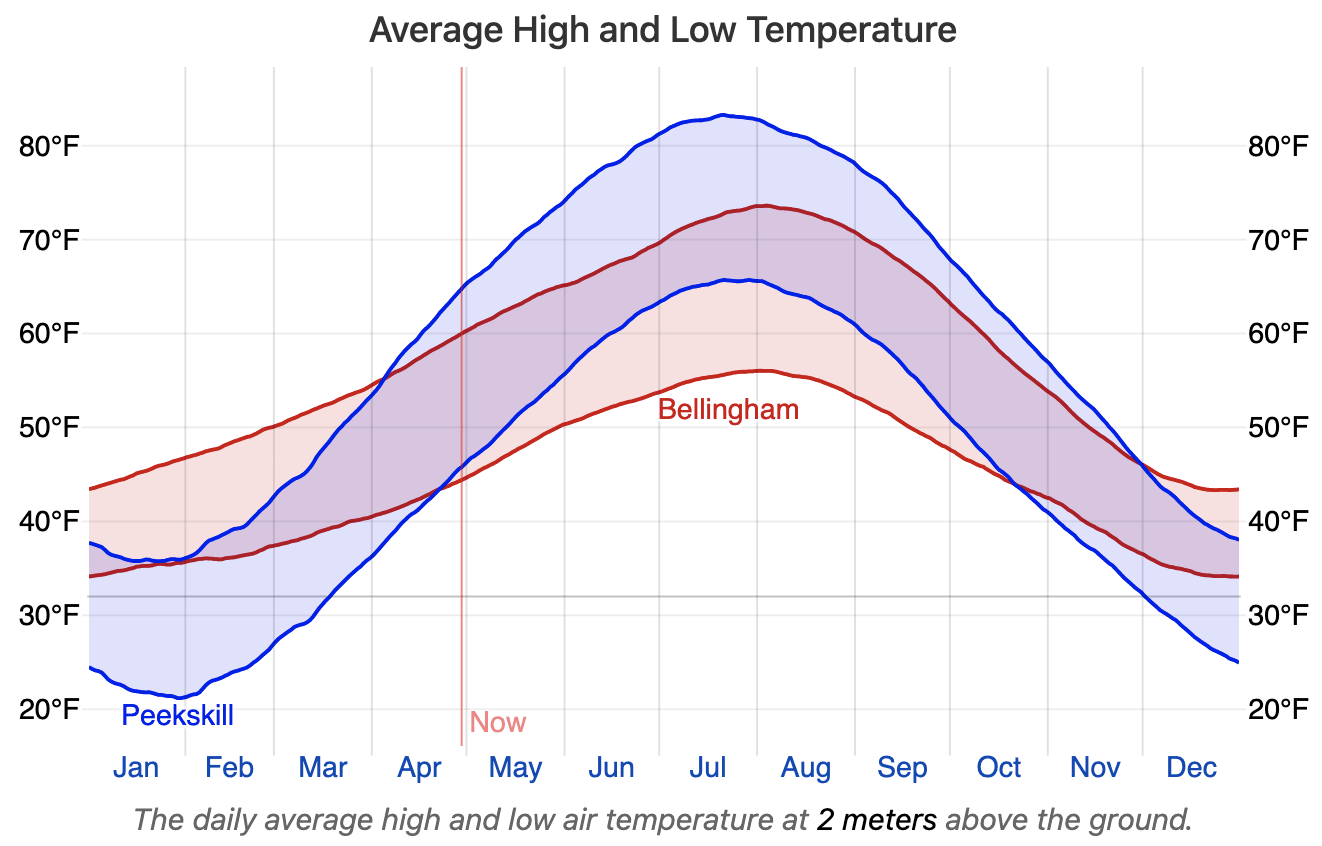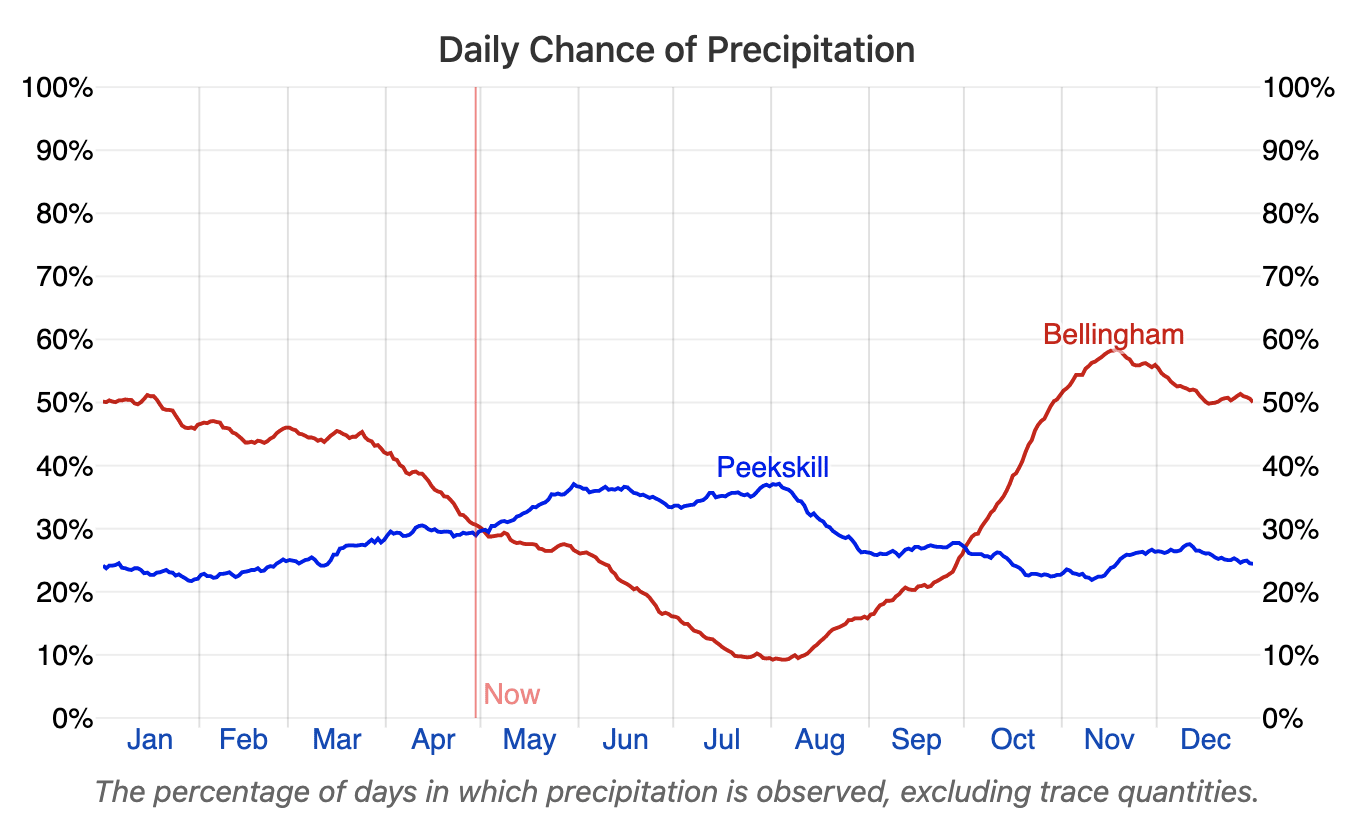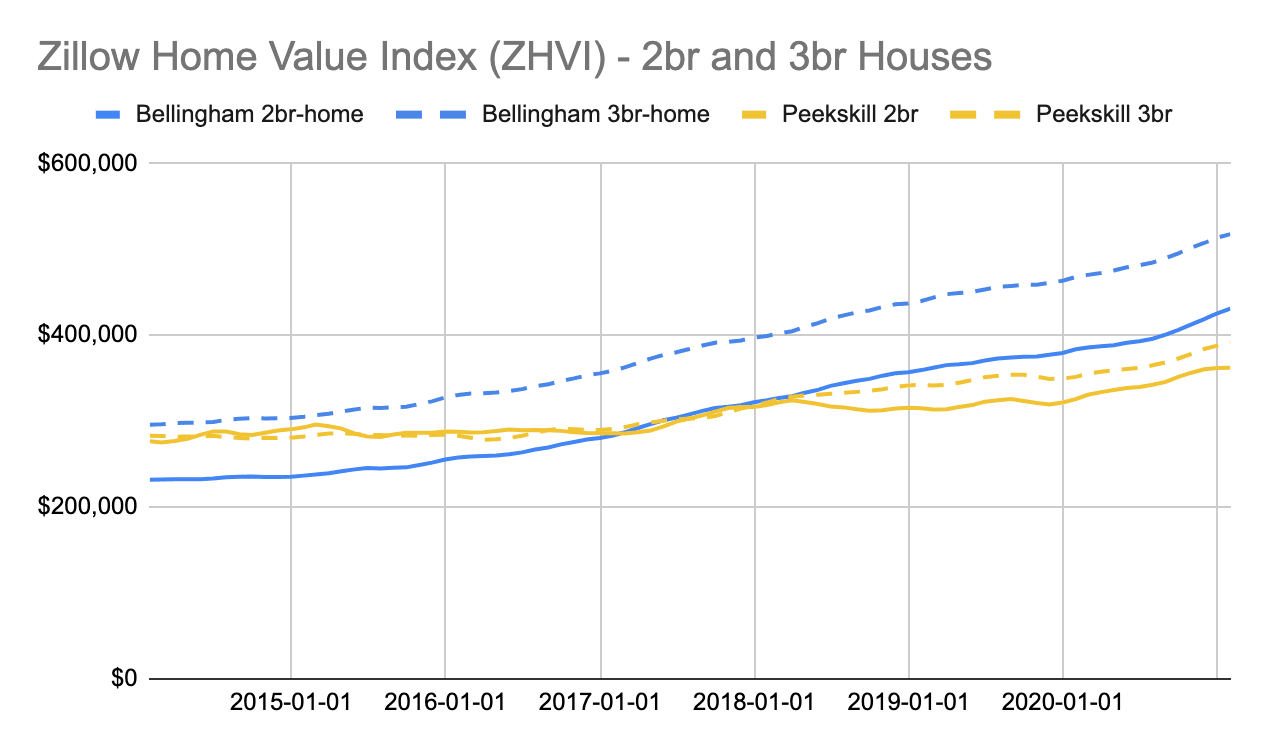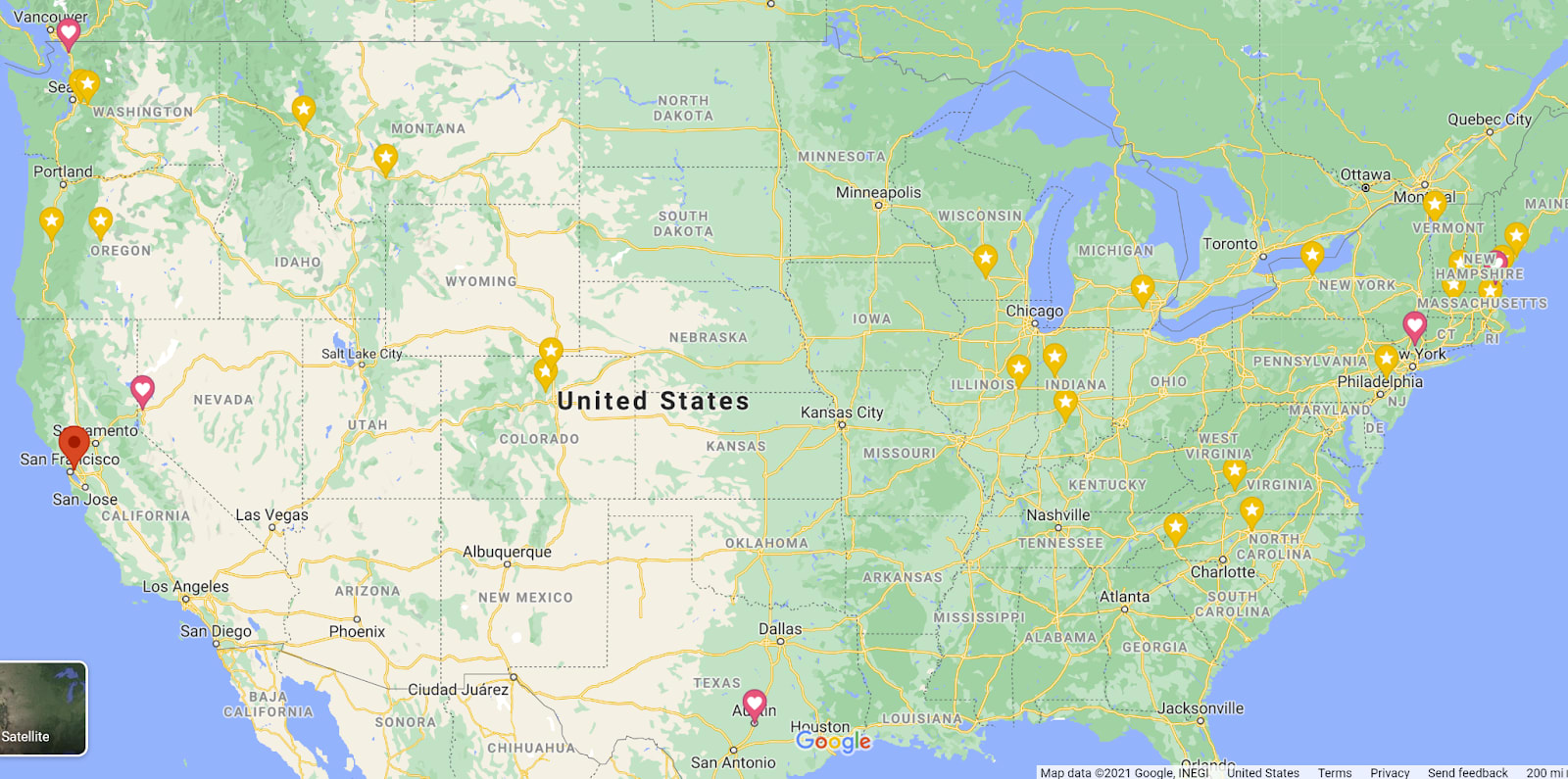Added June 28: Blake Borgeson comments below,
Update: After a lot more discussion and thinking things over, MIRI has decided against relocating away from the Bay Area, unless a new impetus comes along to move some time in the future.
Mainly, ongoing/propagating strategic updates are behind this decision. We're more uncertain about our strategy overall following our 2020 strategy update (https://intelligence.org/2020/12/21/2020-updates-and-strategy/#3), so we’d rather not pay a big up-front move cost based on a prediction about what we expect MIRI to look like 2 or 5 years from now. Related to the same strategic updates, over the next 12 months or so we plan to experiment with placing less of an emphasis on staff working from our Berkeley base, and expect some staff to live and work from other places.
Separately, in the background, considerations against our recent favorite places became stronger:
- Bellingham is far away from big cities, and it seemed increasingly like MIRI would be more isolated there than we wanted. Also, we became more concerned about low light levels during winter months.
- The area around Peekskill has some of the highest Lyme disease incidence in the US, and it seems possible this is a high enough risk of disability to cause us to want to avoid it. We were still investigating this when we ended our location search.
Who am I? I’m a MIRI board member, and was in recent months leading/coordinating this MIRI relocation decision process, which is now complete.
Thanks for all the feedback in these comments, in emails, and on Facebook. I (and probably others) read all of it I could find, and it was important input for us.
Original post:
MIRI is moving (with high probability)!
We haven’t finalized a location yet, but there’s a good chance we’ll make our decision in the next six weeks. I want to solicit:
- Feedback on our current top location candidates.
- Ideas for other places that might fit our criteria.
I’m also interested in a more general location-optimizing discussion. What are your general thoughts on where you’d like to live, and have they changed any since the hub conversations Claire began in September and November? If a new rationality community hub sprang up at any of these locations, would you be tempted to join? Is there a different place you’d prefer (either personally, or for the community)?
Anything from 'statements of personal preferences' to 'models of how the rationality community might make humanity's future much more awesome' is welcome in the comments.
What kind of place we're looking for
Our priority is to find a place where we think researchers will be able to think unusually clearly and well, in line with our December update. Recently, we’ve been looking for a campus or proto-campus (one or more buildings, with space and legal ability to build more) that's:
- far enough away from urban areas to be maximally calm, quiet, and close to nature; and
- near enough to urban areas to ensure there are people to see and things to do in driving distance, and to provide access to city conveniences (food delivery, ridesharing, lots of restaurants, etc.).
These proto-campus-type properties seem to be very rare and hard to find. E.g., we heard good things about Madison, WI and spent time looking for a property in the area, but ended up finding zero candidates currently on the market (that weren't falling apart, etc.).
If you want to convince MIRI to move to your favorite city, one good route would be to find a property like this for sale and either email it to Alex Vermeer or PM me (please don’t post specific property options you’re recommending publicly). The best places we’ve found have often been at the outskirts of pleasant, walkable 50k-100k population cities or college towns.
The specific factors we've been looking at fall under three rough, overlapping categories:
1. Is this a good place to think?
This is the biggest factor, and includes...
- Physical environment: How much do we expect this place to make it easy for researchers to go on peaceful walks to think, talk, etc.? The best options will tend to be secluded, close to nature, and safe-feeling. The worst options will tend to be busy and chaotic, or distracting/jarring for hard cognitive work.
- Social environment: What's the local vibe? If we absorb the local vibes, does this make us better or worse at things? Is there strong pressure in the direction of “it's silly/bad/crazy to try to save the world” or “elites aren't dropping the ball”? If the US, the world, or Twitter suddenly got a lot more socially chaotic, would the place we're in provide a feeling of safety, resilience, and nondistraction? (See also 2 and 3 below.)
- Usability and scalability: The property has good indoor work and hangout spaces, or spaces that could be easily converted into such in a reasonable timeframe: we want to be able to start doing research here in the near future, without spending 6+ months to get an initial setup in place. The property is also large enough—probably at least 20 acres, and ideally 50+ acres. It's easy to build on the land (and otherwise modify the property), or easy to expand over the years by buying properties within walking distance as they go on the market.
2. Is this otherwise a good place for MIRI staff to live?
If we go with the proto-campus plan, we’re likely to start with most staff living in the city proper (possibly with a second office there). More folks may move to the campus as we build it out or acquire more property.
We’re likely to be happier if we have friends and colleagues, community spaces, etc. on or near the campus and in the city, though we don't have a settled view on what size or kind of local rationalist community would be ideal.
Regardless of how many MIRI staff are living on campus (and although our biggest constraint is "can we find a proto-campus for sale here at all?"), features of the city and area will inevitably matter a lot.
- (Proto-)campus: Access to city conveniences (Uber, UberEats, etc.). The campus is a nice place to live, and close enough to other places staff can live that commutes don't have to be long.
- City: The city is nice to live in, walkable, fun, and safe. Housing is affordable. The area doesn't feel prone to (present or future) political violence, street fighting, riots, instability, etc. The culture is relaxed and LGBTQ-friendly.
- Area: Taxes aren't high, and aren’t likely to sharply rise in the future. It seems highly unlikely that the government (at any level) will be very anti-technologist six months or ten years from now. The weather isn’t too extreme. Etc.
3. How good is this place socially (and how good could it become)?
This overlaps with 2, since the things that make a city nice for MIRI staff also affect whether other people will like it.
- We want to mesh well with people who already live here, so we can make new social connections, benefit from the intellectual exchange with people in the area, and recruit people to do research.
- We want our partners, friends, and colleagues to like it here and have strong job options in the area.
- We want it to be easy and attractive for friends, colleagues/collaborators on alignment research, and potential hires to visit, and for us to visit them. E.g., places that are close to the Bay and have a major airport will score well here.
Our current top choices
Bellingham and Peekskill
We’ve spent hundreds of hours searching through long lists of candidates, and have pared those down to 30 relatively promising parts of the US, including two that look quite good as campuses and three other areas we especially like (but haven’t found a property in).
The two campus options we like (that do the best job of satisfying the criteria I listed above) are near (or on the outskirts of) two cities:
Bellingham, Washington: A 90,000-population town near the Canadian border. Located in between Seattle (80–120 minutes south, depending on traffic) and Vancouver, Canada (65–165 minutes north, depending on traffic and border crossing delays), with Puget Sound on one side and forests and a lake and distant mountains on the other. It seems enjoyably walkable near downtown (adjacent neighborhoods: 1, 2, 3), it feels vibrant and youthful, it's pretty good on crime, and considering all those positives and being on the coast, housing is relatively available and affordable.
It's a bit cloudier than Seattle, which is among the cloudiest parts of the country (something like 35% of the possible sun hours are sunny, compared to 38% for Seattle and 52% for Ann Arbor; this % depends heavily on your source though). It’s especially cloudy and rainy during the winter, though usually the rain and clouds come and go from day to day, and in July and August it’s beautiful almost every day. It’s hardly ever cold and hardly ever hot.
Also: unlike a lot of places we’ve considered, very little distraction/misery from mosquitoes!
(Edit: Removed CDC mosquito map because it's only looking at two species of mosquito.)
The proto-campus we’re looking at is located in a peaceful, wet, quiet forest, full of walking trails. Our current gestalt impression of the city itself is that it’s full of hipsters and hobbyists, plus people who moved to the town for the beautiful environs and small-town aesthetic.
Folks seem to come here for good food, breweries, nature, and maybe plays to go to, and to attend Bellingham's (unimpressive) medium-sized public university; or they come to escape things they dislike about the rest of the west coast. Hobbies are a very big thing here: sports, hiking, rock climbing, going to the mountains, kayaking on the sound, etc. There aren’t many jobs here except for the service industry—it’s a town of students, hip retirees, and people working remotely in Seattle or California.
Bellingham International Airport does not have international flights (?!) and is quite small, but does have direct flights to Oakland several times a week.
Peekskill, New York: A small 24,000-person town on the Hudson River, 60–120 minutes by car or 65–75 minutes by train from New York City. (Video tour.) Blake Borgeson shares his impressions of this option:
NYC is our big nearby city, and it seems like roughly the best big city. My picture here at the moment, which I mostly got from Zvi, is that the big way NYC is different from other big cities is it’s more like 10 big cities with 10 different cultures, all of them coexisting in the same place and something between ignoring and welcoming one another. NYC is a place where doing your own thing and bringing your own culture is totally welcome.
Zvi seems enthusiastic about NYC culture’s effects on MIRI. (IIRC, he thinks that New Hampshire and Austin are probably the two best US locations for MIRI in terms of epistemic effects on us, and I currently mostly buy this claim.)
Peekskill is highly diverse and functional-seeming and real-seeming in a way that seems connected to it being near NYC. The folks I’ve talked to who live near Peekskill feel like Vermonters, progressive rural-ish folks, and I like them so far. They treat the land the way I want it treated—like, the nature here is beautiful, we can all agree, and you want to showcase it and preserve it rather than golf course it or English manor it.
Besides diversity and coexisting, the culture of this area feels simpler, more like some decades ago. Life is more straightforward. There’s no angst about finding your calling and finding your hobbies. You grow up, you find a job, you find love and have a family, you take care of your family, you make money to provide for them, and if you make enough money for it, congratulations, you can relax in your country estate with your family and enjoy that.
Hobby-type things seem not quite to fit in around here. So compared to Bellingham, Peekskill has fewer restaurants that I love (though it has some), and fewer places to sample craft beer, and fewer ways for adults to do things like sports (35 minutes driving from Peekskill to the nearest adult soccer league I could find online, for instance).
Some MIRI staff would live in Peekskill, while others live in more rural houses outside of town. The campus we’re looking at adjoins big forested hills with trails winding throughout, little used and with space to wander in nature for hours. A couple of miles on these trails takes you to the Appalachian Trail, if you want to go on longer hikes.
The area has real seasons, with deciduous trees that lose their leaves in the fall. Winter is much colder than in Bellingham, and summer is much hotter. (Bellingham’s weather is something like Berkeley’s with everything shifted 5-10°F colder.)


A big draw of the Peekskill area for us is that we’re currently a lot more interested in being near New York City than being near Seattle/Vancouver. We could imagine starting a chain of rationalist communities along the Hudson Valley train line, allowing the full range from “very rural” to “very urban” life for people with different tastes. The train itself comes hourly, has plenty of seating (during non-COVID times, it seems you might have to stand for half the trip back from Grand Central at certain times of day), and is nice to ride (more like Caltrain, not the BART).
The campus options we’re looking at in the Peekskill area are also faster and easier to set up, requiring less construction. And there’s a small airport 35–60 minutes north, typically used to fly to Philadelphia International and then connect to another flight.
On the other hand, Bellingham is closer to our connections in the Bay Area, and is a much more exciting town than Peekskill in its own right: more restaurants and grocery stores, more climbing gyms, etc. NY state taxes are also higher.
Both Bellingham and Peekskill are quiet, safe, and relatively affordable (though not stunningly affordable—and as with most places, prices are on the rise):

Both locations are cheaper than the Bay, have fewer local amenities, have worse job markets, and have (what I'd expect most people to consider) worse weather than the Bay. Homes in Bellingham are roughly 0.4x the $/sqft in Berkeley.
Some of the biggest questions we’d love answered about these areas are:
- Lyme disease: A potentially serious disadvantage of the Peekskill area, especially for outdoorsy or rural-life-enjoying rationalists, is that it’s tick country. Information like the following could do a lot to influence how good the place looks to us:
- How common is Lyme disease around Peekskill? (According to this article, the Hudson Valley both has the highest number of ticks in New York state and the highest number of Lyme-carrying ticks per tick. Estimating local prevalence of the disease in humans is very important but seems tricky, since many cases go undiagnosed.)
- Lyme disease rates are rising fast in the US—up 10x in the last 30 years. Given that, how much should we expect incidence to increase in areas that are already hard-hit?
- Are there relatively easy, effective, and politically feasible ways to reduce the number of deer ticks in the area? (Examples.)
- How harmful, and common, are long-term symptoms from Lyme disease?
- How easy is it to reduce risk of catching Lyme disease, or risk of long-term symptoms? How effective is it to avoid walks, hikes, picnics, shaded-woodsy-areas, etc.? How effective is it to check for ticks with such-and-such frequency, and such-and-such thoroughness or laziness? (The CDC claims, somewhat vaguely: “In most cases, the tick must be attached for 36 to 48 hours or more before the Lyme disease bacterium can be transmitted.”)
- How costly is it in microLymes to have long hair, a beard, or lots of body hair?
- The CDC claims that Lyme is usually transmitted by nymphs, because they’re tiny and hard to spot during a tick check. How big is this effect, and what are its implications?
- Is there a weird trick that can basically eliminate the risk of tick bites while walking around? E.g., Alan Eaton proposes “When outdoors for any length of time, tuck your shirt into your pants and your pants into your socks. Wear tall rubber boots that are too smooth for most ticks to grab onto. Apply insect repellent and/or wear insect [repellent] clothing.” How effective are these measures?
- How effective is it to monitor for symptoms of Lyme, and administer antibiotics early in response to certain triggers?
- How soon will we have Lyme vaccines of such-and-such effectiveness? Is there a faster option, like bringing back LYMErix or just using the veterinary Lyme vaccine? How likely is it that the vaccines (or some other intervention) will drastically reduce the severity or frequency of long-term Lyme symptoms in people already suffering from them?
- Uber access in non-plague years:
- Regarding Bellingham, Blake reports: “At the moment there's not much Uber service—maybe 1/4 of the time during normal hours I can find an Uber there. I am pretty confident (85%?) that this is a COVID effect, with 75% of the students not being around, and that at least during school sessions there will be Ubers, but I still need to check this. I'm less confident (60%?) that Ubers will be readily available after COVID when school isn't in session.”
- Regarding Peekskill: “Right now there often aren’t Ubers around. A Peekskill local said there were lots of Ubers before COVID, and especially on Fri/Sat evenings when things are busier. “
- It would be very useful to know exactly how easy it is to get ride-shares in these areas during non-COVID times.
- How many rationalists might want to live here?
Other candidates
We also feel some pull to strongly consider the following places more, despite so far not finding properties that fit our campus vision very well there:
- the parts of New Hampshire nearest Boston;
- the Austin, Texas area; and
- Reno, Nevada.
I’d currently assign about 50% probability to “we move to the Peekskill or Bellingham area, or somewhere similar, on the strength of properties available there,” and 50% to “we largely give up on the proto-campus idea and move to someplace more like an office building or set of buildings in a city like Reno, not nature-y or lush but still a pleasant, relaxed place for going on walks to think.”
We’re also still open to suggestions of cities and properties, at least for the next two weeks (and possibly longer). Here are a bunch of other places we’ve seriously considered and in some cases visited:
- West Coast: Bend, OR; Eugene, OR; Issaquah, WA; North Bend, WA
- Rocky Mountain: Boulder, CO; Fort Collins, CO; Bozeman, MT; Missoula, MT
- Southwest: —
- Great Plains: —
- Midwest: Urbana-Champaign, IL; Bloomington, IN; West Lafayette, IN; Ann Arbor, MI; Madison, WI
- South: Asheville, NC; Greensboro, NC; Blacksburg, VA
- Mid-Atlantic: Rochester, NY; the Philadelphia, PA area (e.g., Lambertville, NJ)
- New England: the Amherst/Springfield, MA area; the outskirts of the Boston metropolitan area (e.g., Norwood, MA); Portland, ME; Keene, NH; Portsmouth, NH; Burlington, VT

Although we’ve been focusing heavily on the US in our search, we’re also still interested in country suggestions, if you think Canada or some other part of the world scores especially well on metrics like “unlikely to see a future tech backlash or eat-the-rich revolt that makes it decreasingly attractive to live in.” From our perspective, a higher-but-stable tax rate is better than a lower present rate with a lot of future instability and unpredictability.
As I said at the start of the post, I want to hear people's thoughts about the locations I mentioned (especially our five favorites), and arguments for other locations. Either 'is this a good place for MIRI?' or 'is this a good place for a rationalist hub?' / 'are there worlds where I'd be happy moving here if a hub does spring up?'
I'm also looking for recommendations of specific properties to buy. We've found that criteria like the ones I listed narrow the candidate list a lot, so we may end up giving up on the campus dream. (E.g., if you search for parts of the US that are quiet and close to nature, have Uber/Lyft access, are walkable, aren't extremely conservative, aren't too low-population, are permissive about zoning, have low crime rates, don't have super-high elevation, don't have super-high heat, and have a campus-like property on the market, you end up with a very short list.)
Thanks to Blake Borgeson and Alex Vermeer for reviewing this post, and for doing most of the legwork to help MIRI think through move tradeoffs and logistical details. Any remaining errors are probably theirs, since they did most of the hard cognitive work and I just wrote a post about it.
Please let those of us here know when you do come and we'd be more than happy to show you around or help with your search! I'm originally Australian, was in NY for 8 years then South Bay 1 year, and sea coast NH is by far my favorite so far for many reasons. 1 hour from Boston is also a huge plus.